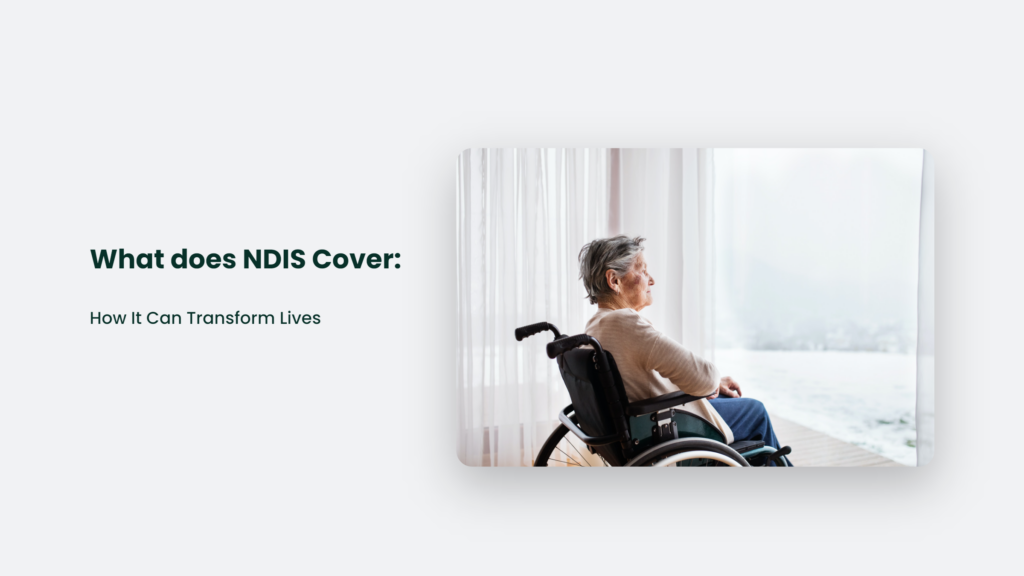

What does NDIS Cover: How It Can Transform Lives

As Seen On
The National Disability Insurance Scheme (NDIS) has been a game-changer for many Australians living with disabilities. With over 500,000 participants now benefiting from the program, it’s essential to understand what does NDIS cover and how it can make a significant difference in people’s lives. So, let’s dive in and explore the ins and outs of this life-changing initiative.

What Does NDIS Cover?
The NDIS provides funding for various supports and services, including education, employment, social participation, independence, living arrangements, and health and well-being.
These supports aim to help participants pursue their goals, increase their independence, enhance community and workplace participation further education, and develop their capacity to engage in the community actively.
Some examples of funded support include:
- Daily personal activities
- Transport for community, social, economic, and daily life activities
- Workplace assistance for employment
- Therapeutic support, including behaviour support
- Household task assistance
- Aids or equipment assessment, set up, and training
- Home modification design and construction
- Mobility equipment
- Vehicle modifications
However, it’s important to note that the NDIS does not cover day-to-day living costs unrelated to disability support needs, such as groceries.
The NDIS funding is divided into three categories: Core Support, Capital Support, and Capacity Building support. Each category has specific line items that describe the types of support participants can access based on their needs and goals.

What does NDIS not Cover?
The National Disability Insurance Scheme (NDIS) provides support to people with disabilities in Australia, but the NDIS does not cover certain types of assistance. These include:
- Supports already provided by the government: The NDIS does not cover supports that are already provided by other government departments or services.
- Supports not related to your disability: The NDIS cannot fund supports that are not directly linked or connected to your disability.
- Day-to-day living costs: The NDIS does not cover costs such as groceries, rent, utilities, phone bills, and event tickets, which are not attributable to your disability support needs.
- Duplicate supports: The NDIS cannot fund supports that duplicate other supports provided by the NDIS under alternative funding.
- Treatment for illness or injury: The NDIS does not fund treatment costs such as medications, hospital stays, and surgical procedures, which Medicare, the national health insurance program in Australia, generally covers.
- Education and training: The NDIS does not provide funding for education and training costs, such as school fees, university fees, and vocational training, generally covered by the Australian education system.
- Supports that are not legal, income replacement, or likely to cause harm or pose a risk to others.
It is important to note that the NDIS is designed to complement, not replace, other government services and supports. If you are unsure whether the NDIS covers specific support, consult a Local Area Coordinator for guidance.
How does the NDIS affect Centrelink payments and other benefits?
The National Disability Insurance Scheme (NDIS) is designed to work alongside other government services and supports, including Centrelink payments. Accessing NDIS funding will not impact your Centrelink payments, as NDIS funding is not included in Centrelink’s income or asset tests.
The NDIS supports disability-related costs, while Centrelink payments like the Disability Support Pension are meant to pay for income support.
It is important to note that if you receive Mobility Allowance from Centrelink and have an NDIS plan, you will no longer receive it. However, your NDIS plan will include support for personal care and transport assistance based on your circumstances.
NDIS payments do not generally affect other government payments, such as the Carer’s Allowance.
Suppose you have any concerns about mental health, or questions about how the NDIS may affect your Centrelink payments or other benefits. In that case, it is recommended to consult a Local Area Coordinator or a support service like Instacare.
The Power of Assistive Technology
One of the most transformative aspects of the NDIS is its focus on assistive technology (AT). AT can range from simple devices like modified cutlery to more complex equipment like power wheelchairs.
The NDIS funds AT based on individual needs, and participants can choose their AT providers. This flexibility allows people with disabilities to access the right tools core supports, and equipment to improve their quality of life and independence.
Assistive technology can be classified into three cost categories:
- Low cost (under $1,500 per item)
- Mid-cost (between $1,500 and $15,000 per item)
- High cost (over $15,000 per item)
The NDIS has different processes for each cost category, ensuring that participants receive the appropriate level of support for their specific needs.
Real-Life Impact: Stories of Transformation
The NDIS has had a profound impact on the lives of many Australians. For example, Sheree Hill, a mother of a son with a disability, shared her positive experience with the NDIS, highlighting how it provided her family with much-needed support and resources. Another participant, Bethany, regained her independence and mobility through the NDIS-funded power wheelchair. These stories showcase the life-changing potential of the NDIS for people with disabilities and their families.
Frequently Asked Questions:
How does the NDIS determine what is reasonable and necessary?
The NDIS makes decisions based on the National Disability Insurance Scheme Act 2013 (NDIS Act) and the rules made under the NDIS Act. The operational guidelines also provide practical guidance for decision-makers.
Can I choose my own NDIS providers?
Yes, NDIS participants can generally choose their providers for the funded supports in their plan, unless their plan indicates otherwise.
What if my needs change over time?
The NDIS is designed to adapt to an individual’s changing disability-related needs. Plans can be adjusted up or down depending on the participant or person’s disability requirements.
The Bottom Line:
In conclusion, the NDIS has significantly impacted the lives of many Australians with disabilities. By funding various supports and services, the NDIS empowers individuals to pursue their goals, increase their independence, and actively participate in their communities. With its focus on flexibility in choosing providers, the NDIS is truly a transformative initiative that continues to improve lives.
Konger
Up until working with Casey, we had only had poor to mediocre experiences outsourcing work to agencies. Casey & the team at CJ&CO are the exception to the rule.
Communication was beyond great, his understanding of our vision was phenomenal, and instead of needing babysitting like the other agencies we worked with, he was not only completely dependable but also gave us sound suggestions on how to get better results, at the risk of us not needing him for the initial job we requested (absolute gem).
This has truly been the first time we worked with someone outside of our business that quickly grasped our vision, and that I could completely forget about and would still deliver above expectations.
I honestly can't wait to work in many more projects together!
Disclaimer
*The information this blog provides is for general informational purposes only and is not intended as financial or professional advice. The information may not reflect current developments and may be changed or updated without notice. Any opinions expressed on this blog are the author’s own and do not necessarily reflect the views of the author’s employer or any other organization. You should not act or rely on any information contained in this blog without first seeking the advice of a professional. No representation or warranty, express or implied, is made as to the accuracy or completeness of the information contained in this blog. The author and affiliated parties assume no liability for any errors or omissions.

